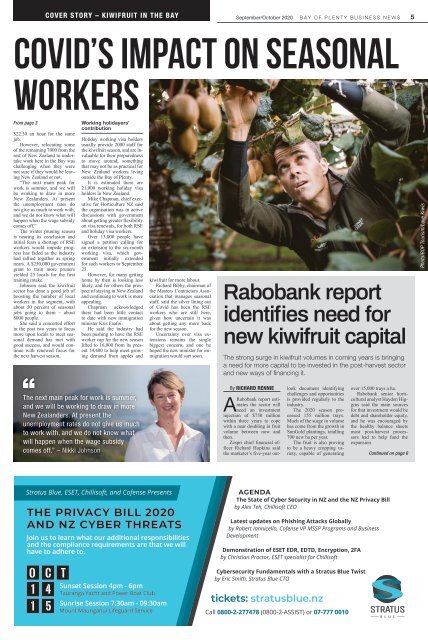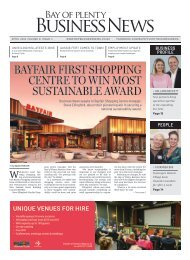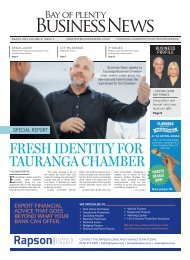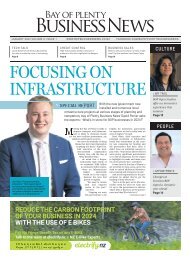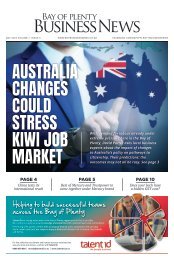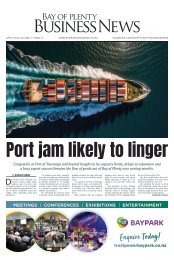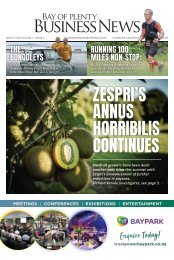Bay of Plenty Business News - September/October 2020
From mid-2016 Bay of Plenty businesses have a new voice, Bay of Plenty Business News. This new publication reflects the region’s growth and importance as part of the wider central North Island economy.
From mid-2016 Bay of Plenty businesses have a new voice, Bay of Plenty Business News. This new publication reflects the region’s growth and importance as part of the wider central North Island economy.
You also want an ePaper? Increase the reach of your titles
YUMPU automatically turns print PDFs into web optimized ePapers that Google loves.
COVER STORY – KIWIFRUIT IN THE BAY<br />
<strong>September</strong>/<strong>October</strong> <strong>2020</strong> BAY OF PLENTY BUSINESS NEWS 5<br />
covid’s impact on seasonal<br />
workers<br />
From page 3<br />
$22.30 an hour for the same<br />
job.<br />
However, relocating some<br />
<strong>of</strong> the remaining 7000 from the<br />
rest <strong>of</strong> New Zealand to undertake<br />
work here in the <strong>Bay</strong> was<br />
challenging when they were<br />
not sure if they would be leaving<br />
New Zealand or not.<br />
“The next main peak for<br />
work is summer, and we will<br />
be working to draw in more<br />
New Zealanders. At present<br />
the unemployment rates do<br />
not give us much to work with,<br />
and we do not know what will<br />
happen when the wage subsidy<br />
comes <strong>of</strong>f.”<br />
The winter pruning season<br />
is nearing its conclusion and<br />
initial fears a shortage <strong>of</strong> RSE<br />
workers would impede progress<br />
has faded as the industry<br />
had rallied together as spring<br />
nears. A $250,000 government<br />
grant to train more pruners<br />
yielded 25 locals for the first<br />
training intake.<br />
Johnson said the kiwifruit<br />
sector has done a good job <strong>of</strong><br />
boosting the number <strong>of</strong> local<br />
workers in the segment, with<br />
about 50 percent <strong>of</strong> seasonal<br />
jobs going to them – about<br />
8000 people.<br />
She said a concerted effort<br />
in the past two years to focus<br />
more upon locals to meet seasonal<br />
demand has met with<br />
good success, and would continue<br />
with renewed focus for<br />
the next harvest season.<br />
Working holidayers’<br />
contribution<br />
Holiday working visa holders<br />
usually provide 2000 staff for<br />
the kiwifruit season, and are invaluable<br />
for their preparedness<br />
to move around, something<br />
that may not be as practical for<br />
New Zealand workers living<br />
outside the <strong>Bay</strong> <strong>of</strong> <strong>Plenty</strong>.<br />
It is estimated there are<br />
21,000 working holiday visa<br />
holders in New Zealand.<br />
Mike Chapman, chief executive<br />
for Horticulture NZ said<br />
the organisation was in active<br />
discussions with government<br />
about getting greater flexibility<br />
on visa renewals, for both RSE<br />
and holiday visa workers.<br />
Over 13,000 people have<br />
signed a petition calling for<br />
an extension to the six-month<br />
working visa, which government<br />
initially extended<br />
for such workers to <strong>September</strong><br />
25.<br />
However, for many getting<br />
home by then is looking less<br />
likely, and for others the prospect<br />
<strong>of</strong> staying in New Zealand<br />
and continuing to work is more<br />
appealing.<br />
Chapman acknowledged<br />
there had been little contact<br />
to date with new immigration<br />
minister Kris Faafoi.<br />
He said the industry had<br />
been pushing to have the RSE<br />
worker cap for the new season<br />
lifted to 16,000 from its present<br />
14,400 to help meet growing<br />
demand from apples and<br />
kiwifruit for more labour.<br />
Richard Bibby, chairman <strong>of</strong><br />
the Masters Contractors Association<br />
that manages seasonal<br />
staff, said the silver lining out<br />
<strong>of</strong> Covid has been the RSE<br />
workers who are still here,<br />
given how uncertain it was<br />
about getting any more back<br />
for the new season.<br />
Uncertainty over visa extensions<br />
remains the single<br />
biggest concern, and one he<br />
hoped the new minister for immigration<br />
would sort soon.<br />
Rabobank report<br />
identifies need for<br />
new kiwifruit capital<br />
The strong surge in kiwifruit volumes in coming years is bringing<br />
a need for more capital to be invested in the post-harvest sector<br />
and new ways <strong>of</strong> financing it.<br />
Photo/BOP Tourism/Love Kiwis<br />
The next main peak for work is summer,<br />
and we will be working to draw in more<br />
New Zealanders. At present the<br />
unemployment rates do not give us much<br />
to work with, and we do not know what<br />
will happen when the wage subsidy<br />
comes <strong>of</strong>f.” – Nikki Johnson<br />
By RICHARD RENNIE<br />
A<br />
Rabobank report estimates<br />
the sector will<br />
need an investment<br />
injection <strong>of</strong> $750 million<br />
within three years to cope<br />
with a near doubling in fruit<br />
volume between now and<br />
then.<br />
Zespri chief financial <strong>of</strong>ficer<br />
Richard Hopkins said<br />
the marketer’s five-year outlook<br />
document identifying<br />
challenges and opportunities<br />
is provided regularly to the<br />
industry.<br />
The <strong>2020</strong> season processed<br />
155 million trays.<br />
Much <strong>of</strong> the surge in volume<br />
has come from the growth in<br />
SunGold plantings, totalling<br />
700 new ha per year.<br />
The fruit is also proving<br />
to be a heavy cropping variety,<br />
capable <strong>of</strong> generating<br />
over 15,000 trays a ha.<br />
Rabobank senior horticultural<br />
analyst Hayden Higgins<br />
said the main sources<br />
for that investment would be<br />
debt and shareholder equity,<br />
and he was encouraged by<br />
the healthy balance sheets<br />
most post-harvest processors<br />
had to help fund the<br />
expansion.<br />
Continued on page 6


